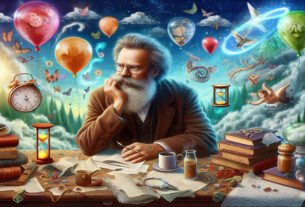Today, we’re hosting one of the 20th century’s most “rebellious” thinkers, Cornelius Castoriadis. To understand him, you must think like an explorer navigating not just philosophy, but also politics, psychoanalysis, economics, and history. Because he tried to teach us not just to think, but to reconstruct the world.
His Life: A Lifetime Transcending Borders 🧳🌉🗺️
Castoriadis’s life is like a preview of his philosophy. He was born in 1922 in that magnificent city, Istanbul. While still a young child, he moved with his family to Athens, Greece. During his years there, he witnessed the darkness of World War II and the Nazi occupation. These experiences planted the seeds of his radical critique of authority, oppression, and the status quo. He joined the communist resistance but quickly distanced himself from the bureaucratic and totalitarian structure of Stalinism. In 1945, he went to Paris on a scholarship and, in fact, never returned. He spent the rest of his life in France as a thinker, economist, and psychoanalyst.
This state of being an immigrant deeply influenced his thought. He never quite fit into any “national” mold. He was a thinker “in-between,” beyond borders. This was also the key to his ability to analyze societies from the outside, with a critical eye.
His Works and the Cornerstones of His Philosophical Project 📚✍️🔑
Castoriadis’s philosophy essentially formed around two major works and one journal:
- The “Socialisme ou Barbarie” (Socialism or Barbarism) Journal: 🗞️⚖️🔥 Founded in 1949 with figures like Claude Lefort, this journal was the manifesto of his political identity. Here, he criticized both capitalism and Soviet bureaucratism as different facets of “barbarism.” According to him, both systems were alienating systems that prevented people from having a say in their own lives.
- “L’Institution Imaginaire de la Société” (The Imaginary Institution of Society): 🌈🧩💡 Published in 1975, this masterpiece is the foundation of his philosophical system. This, my love, is where the magic begins.
Key Concepts: A Key Set for Understanding the World 🗝️🧩🧠
1. The Radical Imaginary of Society (L’imaginaire radical): 💭👥🌟
This is Castoriadis’s most important contribution. Traditional thought claimed that societies could be explained either by “reason” or “material conditions.” Castoriadis objected to this: “No!” he said, “Society is the product of an imagination that creatively institutes itself.”
What does this mean? Look at the society you live in right now. Money, the state, family, law, morality… None of these exist in nature! They have no physical reality like a tree or a stone. So how do they appear so “real”? Here is Castoriadis’s answer: Because we all, collectively, imagine them to be real and meaningful. This is not an individual fantasy, but a constitutive power that holds society together and gives it meaning. When you look at a banknote, you actually see a colorful piece of paper, but the social imaginary makes it “valuable.” Castoriadis’s following saying fits perfectly here: “Man is the only being with the capacity to create himself.”
2. The Project of Autonomy: 🗽🤝⚙️
So, does this “constitutive imaginary” remain the same forever? Of course not. Castoriadis argues that throughout history, societies have oscillated between heteronomy (laws laid down by others) and autonomy (laws laid down by oneself).
- Heteronomy: 🚫👑⛓️ Traditional societies are generally heteronomous. Rules are presented as the commands of “gods,” “ancestors,” or “traditions.” They cannot be questioned. “It has always been this way, so it shall remain.”
- Autonomy: ✅🧑🤝🧑🔧 This is the greatest project of humanity, advocated by Castoriadis. Autonomy is society’s conscious and free re-institution of its own institutions, upon becoming aware of their origin and validity. In other words, it is acknowledging that we derive our laws not from God, but from our own collective reason and will. This is the ideal embodied in the spirit of Athenian democracy or modern revolutions. For Castoriadis, the ultimate aim of philosophy and politics is to create an autonomous society.
3. Creativity and the Radical Novum (The Radically New): 💥🎨🚀
Castoriadis vehemently opposed Marxist and positivist views that claimed history and society operated according to deterministic (predictable) laws. According to him, radical novelty is possible in history – ruptures that are unpredictable and cannot be fully explained causally. Works of art, great philosophical systems, revolutions… These are all examples of “radical newness” created by the social imaginary. This adds a dimension of hope and freedom to his thought. Not everything is preordained; humanity can create its own future.
Gems from His Writings and Sayings: 💎📜🖋️
- “Society is a meaning-creating machine.” (L’Institution Imaginaire de la Société) – This sentence summarizes his entire system.
- “Democracy is the name of the regime where the people are truly in power. Today, we have this nowhere.” 🗳️👑🙅♂️ – In his view, today’s “representative democracies” are a weak shadow of autonomy. Real democracy is direct participation.
- “The revolutionary project is the project of creating an autonomous society; this means people consciously and freely exercising sovereignty over their own lives, institutions, and history.” ✊🌍🔓
- “A life unexamined is not worth living.” 🤔❓❤️ – Here we see his point of convergence with Socrates.
Also interested in psychoanalysis, Castoriadis said that the counterpart of the radical imaginary in the individual is the radical psyche. The human unconscious is not subject to the rules of logic; it too constantly creates new images and meanings.
His Poems and Literary Side: 📝✨🎭
Although a systematic philosopher, Castoriadis also wrote poems. While not quoted as often as his philosophical texts, his poems reveal his lyrical and creative side. For example, in one poem he says:
“Words do not change the world,
But those who will change the world,
Cannot act without words.”
These lines reflect his deep insight into the dialectical relationship between language, action, and transformation. His philosophy is not abstract; it is a call to action.
What Would Castoriadis Tell Us Today? 🗣️🌐🔮
- On the Climate Crisis: 🌍🔥🆘 “This problem is not just a technological issue; it requires a new social imaginary on a global scale, a new project of autonomy. We must fundamentally change our consumption-oriented imaginary!”
- His View on Social Media: 📱💀🤖 “These platforms are a new field for the ‘constitutive imaginary.’ But beware! Is this imaginary autonomous or a heteronomous imposition by corporations? Don’t lose control of your own imagination!”
- On Political Disappointments: 🏛️😔💪 “No system is eternal. The ‘end of history’ is a lie. We have the power to create a new social imaginary together. Don’t despair, organize, discuss, create!”
In Place of a Final Word: 🎯🤗❤️
Castoriadis reminds us of the responsibility not just of a philosopher, but of a “citizen.” His philosophy is not a grace, but a duty. He whispers this to us: “You are not passive spectators of this world, but its active architects. The institutions you live within are your creation. And if they make you unhappy, you have the right and the responsibility to change them, even to dismantle and rebuild them from scratch.”
Therefore, pause for a moment and ask yourself: Which constitutive imaginary do I live within? Does this imaginary nourish my freedom and creativity, or does it stifle them? And can I dare to dream the dream of a more autonomous, more just, more meaningful society?
Castoriadis’s voice reaches us across the centuries, precisely so that we may ask this question.
Until we meet with the next thinker… With new questions and new dreams! 😊




